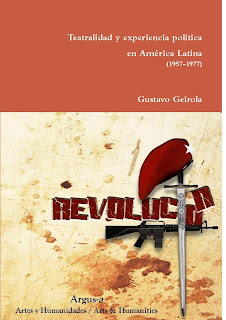Este libro puede adquirirse en amazon.com y en lulu.com
Ilustración de tapa: Vania Paola Bilen
 El ensayo investiga la relación entre la producción teatral y la actividad política en el período que va de 1957 a 1977, conocido como los sesentas o sixties. La interrogación del libro se enfoca en dilucidar las razones del fracaso y desarticulación de la izquierda política en la región, seguida en la mayor parte de los países por la instalación de regímenes dictatoriales atroces y la decepción subsiguiente. Se esgrime la tesis de una dimensión evangélica de la revolución, en la que el cristianismo filtra el discurso marxista limitando su potencia transformadora y afectando simultáneamente las prácticas políticas y las culturales, particularmente las teatrales. Para ello el autor procede a dar una definición conceptual de la teatralidad como política de la mirada, a partir de Sartre, Marx, Foucault y Lacan, acotando la teatralidad del teatro a su fundamento histórico en la modernidad eurocéntrica. A partir de los textos del Che Guevara, cotejados en la intertextualidad con los de Ignacio de Loyola, se propone para el período una teatralidad de la guerrilla que atraviesa los manifiestos y discusiones de los teatristas, desde la creación colectiva hasta el happening, pasando por diversos dramaturgos emblemáticos de la época (Buenaventura, Pavlovsky, Boal, Teatro Escambray, Luis Valdez, Villegas, Rozenmacher). Una poética perversa del sacrificio y del martirologio, de base cristiana, parece sostener y limitar las rebeldías artísticas en un momento de reacomodación del capitalismo, desde una instancia artesanal al modelo del gran autómata descripto por Marx en El Capital, en medio de los cuales se debate la cuestión de la praxis teatral, del actor, su cuerpo y su formación, desde Stanislavski hasta Grotowski.
El ensayo investiga la relación entre la producción teatral y la actividad política en el período que va de 1957 a 1977, conocido como los sesentas o sixties. La interrogación del libro se enfoca en dilucidar las razones del fracaso y desarticulación de la izquierda política en la región, seguida en la mayor parte de los países por la instalación de regímenes dictatoriales atroces y la decepción subsiguiente. Se esgrime la tesis de una dimensión evangélica de la revolución, en la que el cristianismo filtra el discurso marxista limitando su potencia transformadora y afectando simultáneamente las prácticas políticas y las culturales, particularmente las teatrales. Para ello el autor procede a dar una definición conceptual de la teatralidad como política de la mirada, a partir de Sartre, Marx, Foucault y Lacan, acotando la teatralidad del teatro a su fundamento histórico en la modernidad eurocéntrica. A partir de los textos del Che Guevara, cotejados en la intertextualidad con los de Ignacio de Loyola, se propone para el período una teatralidad de la guerrilla que atraviesa los manifiestos y discusiones de los teatristas, desde la creación colectiva hasta el happening, pasando por diversos dramaturgos emblemáticos de la época (Buenaventura, Pavlovsky, Boal, Teatro Escambray, Luis Valdez, Villegas, Rozenmacher). Una poética perversa del sacrificio y del martirologio, de base cristiana, parece sostener y limitar las rebeldías artísticas en un momento de reacomodación del capitalismo, desde una instancia artesanal al modelo del gran autómata descripto por Marx en El Capital, en medio de los cuales se debate la cuestión de la praxis teatral, del actor, su cuerpo y su formación, desde Stanislavski hasta Grotowski.
Abstract
The essay investigates the relationship between theater production and political activity in the period from 1957 to 1977, known as the sixties or sixties. The interrogation of the book focuses on elucidating the reasons for failure and disarticulation of the political left in the region, followed in most of countries for the installation of atrocious dictatorial regimes and the subsequent disappointment. The thesis of an evangelical dimension of the revolution is debated, in which Christianity filters the Marxist discourse limiting its transforming power and simultaneously affecting political and cultural practices, particularly theatrical ones. In order to accomplish his investigation, the author proceeds to give a conceptual definition of theatricality as politics of the gaze, from Sartre, Marx, Foucault and Lacan, delimiting theater theatricality to its historical foundation in the Eurocentric modernity. From the texts of Che Guevara, collated in intertextuality with those of Ignacio of Loyola, a theatricality of the guerrilla is proposed for this period that goes through the manifestos and discussions of the theater players, from the collective creation to the happening, and also affecting diverse emblematic dramatists of the time (Buenaventura, Pavlovsky, Boal, Escambray Theater, Luis Valdez, Oscar Villegas, Germán Rozenmacher). A perverse poetic of sacrifice and martyrology, based in Christian experience, seems to sustain and limit the artistic rebellions in a moment of readjustment of capitalism, from an artisan instance to the model of the great automaton described by Marx in Capital; both instance and model impact the question of the theatrical praxis, of the actor, his body and his training, from Stanislavski to Grotowski.

